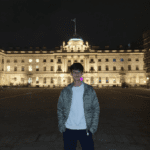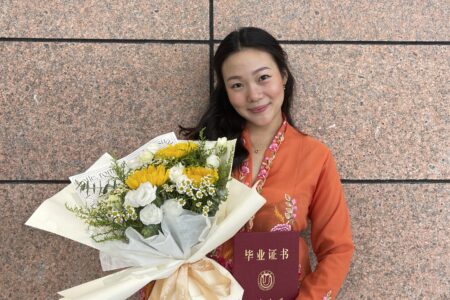
In 2025, internships are nearly twice as competitive as a year ago.
According to the career site Handshake’s 2025 Internship Index, the average applications per internship shot to 109 for 2024-2025, compared to 62 in 2023-2024 and 43 in 2022-2023.
As an international student, securing internships abroad isn’t for the unresolved or hesitant. You’re not only competing with your own cohort of local and foreign students — you’re fighting against everyone and anyone even remotely interested in the job posting.
In South Korea, unless you’re fluent in Korean, have a degree from a top university, or have a highly specialised skill set, your chances of landing an internship here are slim.
Kayla Watson has been there and done that, and she can tell you just as much.

Watson’s experience extends beyond South Korea — she has participated in entrepreneurship programmes and work experiences in the US and Germany. Source: Kayla Watson
The struggles of an international student in South Korea
Watson had two places in mind when it came time to choose where she wanted to finish pursuing her undergraduate studies: Italy and Singapore.
South Korea hadn’t even been on her mind until those options fell through — Italy for not offering the finance programmes she wanted, and Singapore for the visa restrictions during COVID-19.
“South Korea was one of the few countries lenient with visas during the pandemic, and I enjoyed my time here during my visits when I was younger, so I decided to move to South Korea to complete my undergraduate degree,” says Watson.
Her studies there, however, were easier said than done.
Her dream university, Yonsei University, didn’t accept her US associate’s degree, so she opted for Hanyang University’s BS in Finance programme instead. There, she would also have the chance to pursue her studies mostly in English.
“The BS in Finance was taught in 80% English and 20% Korean,” shares Watson. “I spent my first year at Hanyang taking intensive Korean classes to prepare for my undergraduate degree classes, which I had to take in Korean.”

While at Hanyang University, Watson was a teacher’s assistant for an ESG Fund CEO, strategising investment methods for optimised portfolio performance. Source: Kayla Watson
While she spent the first year at Hanyang learning Korean, her finance classes later on in her degree proved to be a challenge.
“I regretted taking these classes at the last minute because if I had taken them at the start of my degree, I could have taken easier ones,” says Watson.
She also felt that the support for international students was lacking, something she felt keenly during her intensive Korean classes.
As its name implies, the language classes were taught entirely in Korean and offered little to no English explanation, making it a steep learning curve for any beginner, much like Watson.
The silver lining in the clouds, however, was that this intensive immersion meant she could pick up the language faster than those who didn’t go for these classes.
Despite the struggles, she pulled through and graduated, ready to take on the working world.

Internships are already hard to secure as an international student; internships in South Korea might just be even harder. Source: Kayla Watson
Getting internships in South Korea isn’t easy
After graduating from Hanyang, Watson started making plans to leave South Korea.
“I wanted to work in Europe; at that point in time, my family had been staying in Germany for about four years,” she says. “But I knew I wanted to leave South Korea because I was afraid of the work culture here.”
South Korea’s work culture is known for its long hours, hierarchical structures, and after-work drinking events. In 2023, the government even proposed raising the maximum weekly working hours from 52 to 69, though it was rejected.
Despite that, South Koreans still worked an average of 1,901 hours in 2022, far above the OECD average of 1,746 and the American average of 1,804, according to the Organisation for Economic Cooperation and Development (OECD).
However, Watson’s plans changed, and she soon found herself wanting to return to South Korea.
“I felt safe in South Korea, and I never needed to worry about my surroundings,” she shares. “The food quality and healthcare are great compared to the US, and I never had to worry much about it.”
That said, she started applying for internships in South Korea, but quickly faced another bump in the road.

Getting internships in South Korea as an international student isn’t for the hesitant — Watson knows that better than anyone. Source: Kayla Watson.
The job-hunting culture shocked her. There were many unexpected events, but one particular instance stood out to her.
“I was at an interview with a foreign company, and the interviewers were both foreigners, but how the company was run was super Koreanised,” says Watson. “Because of that, the turnover rate was high, especially among the foreigners in the company. They rejected me after my interview, but called me back a month later, asking me if I was still open to work, and I was required to work after hours, and even into the middle of the night.”
For Watson, it was a major red flag.
On top of that, Watson soon came to realise that your nationality played a part in securing internships in South Korea too.
As an American, she was more likely to hear back from her applications than those of other nationalities. For example, Watson’s Russian friend struggled getting a job despite having all the qualifications required for the roles, and was turned down simply because of her country of origin.
“I have a friend from Uzbekistan who told me that it’s easy for me to get a job because I’m American,” says Watson. “Unfortunately, if you’re from the UK, US, Western Europe, Canada, Australia, or South Africa, you’re probably more likely to get a job.”
As of late April, Watson has completed her six-month internship and has officially become a regular employee for the company. She was also offered a work visa for the job.

For Watson, securing her internships in South Korea took many, many trials and errors. Source: Kayla Watson
Tips on how to secure internships in South Korea
Securing an internship can be tough no matter where you are, but if you’re looking to land one in South Korea, there are a few practices and expectations you’ll want to familiarise yourself with.
For Watson, who’s navigated the Korean job-hunting scene herself, preparation was everything. From the way you dress to how you present your resume, some key differences might surprise you.
“How you prepare for internships is pretty much universal across all countries,” she says. “However, in South Korea, there are practices that will be unfamiliar to others, such as the way you free your interviewer and getting interviewed alongside two other interviewees at the same time.”
Her first piece of advice? Prepare your documents right.
While there’s a global standard for resumes, South Korea has taken its spin on it.
“South Korean companies often require applicants to include a headshot in their resume,” says Watson. “The country places a high value on appearance, and employers usually use physical attributes to judge the candidate’s suitability for a position.”
You’ll also need to write a self-introduction explaining your background and reasons for applying. Unlike many Western countries, grades — from both high school and university — are typically listed on the resume. And don’t be surprised if you’re asked to use a company-specific resume template.
“That’s not all; you should also prepare all your documents in both Korean and English,” advises Watson. “It’s always best to familiarise yourself with the Korean resume, even if the internship is in English.”
The bottom line? Proper documentation can make or break your chances.
@_kaylawatsonn And here i was worried about life after graduation #CapCut #template #blackgirlmagic #2024 #fy #fyp #fyppp ♬ original sound – JEYYBI
If you’ve ever watched a Korean drama and noticed three interviewees in one room, yes, that actually happens.
“You’ll be in an interview with three interviewees simultaneously,” Watson says. “It happened to me many times and it still does.”
She emphasises the importance of practising your answers ahead of time, whether it’s in front of a mirror or with a friend. Confidence is key — especially when personal questions are asked.
“You’ll blank out sometimes because you’ll feel like you have to compete for the right answer,” she says. “They may even ask you how much you expect your salary to be, and that’s asked in front of the other interviewees. Or even feel like you don’t know what answer is right or wrong. It’s extremely intimidating.”
Another tip? Memorise your answers, just in case your nerves get the best of you.
Last but not least, be aware of the unspoken dress code.
“For women, it’s recommended that you wear a blazer, white button-up, and black slacks, with your hair neatly tied up or let down,” says Watson. “Regarding makeup, it’s best to wear natural or no makeup, no fancy stuff.”
If you don’t own a suit, don’t worry, there are shops all over South Korea that rent out the perfect interview suit. Students can even rent it out for free through partnerships with the local city government.










